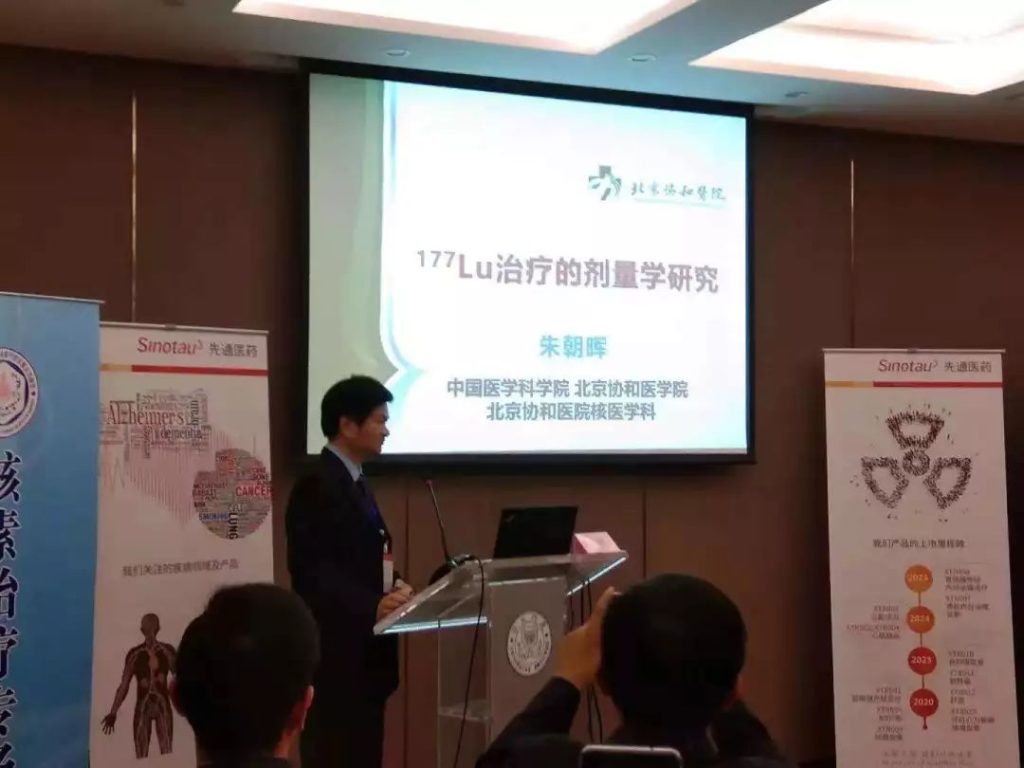先通醫(yī)藥取得美國國立衛(wèi)生研究院(NIH)核素治療前列腺癌的新藥全球授權(quán)
- 發(fā)布日期:2018年11月8日
2018年11月4日,先通醫(yī)藥接受美國國立衛(wèi)生研究院(NIH)前列腺癌放射性新藥研發(fā)項(xiàng)目授權(quán)新聞發(fā)布會在廈門召開。

先通醫(yī)藥首席技術(shù)官張?jiān)C癫┦堪l(fā)布了北京先通國際醫(yī)藥科技股份有限公司獲得美國國立衛(wèi)生研究院授予“治療轉(zhuǎn)移性去勢抵抗前列腺癌的放射性藥物”的全球獨(dú)家開發(fā)及商業(yè)化專利許可的消息(后附 press release的中英文稿)。

中國核學(xué)會同位素分會理事長羅志福先生發(fā)表致辭。他對這個待開發(fā)藥物在治療轉(zhuǎn)移性去勢抵抗前列腺癌方面的潛在療效給予了高度期望,并表示該項(xiàng)治療如果開發(fā)成功,對這類病人延長壽命、提高生命質(zhì)量方面將發(fā)揮巨大作用。他對先通醫(yī)藥近年來對放射性藥物研究和開發(fā)的積極投入和卓有成效的努力表示了高度贊賞,并呼吁科研人員和放射性藥物企業(yè)承擔(dān)起社會責(zé)任,為人類的健康事業(yè)奉獻(xiàn)自己的力量。

該項(xiàng)目專利的發(fā)明者之一,美國國立衛(wèi)生研究院(NIH)的陳小元博士做了關(guān)于放射性藥物治療前列腺癌轉(zhuǎn)移的學(xué)術(shù)報告。他在報告中系統(tǒng)地闡述了他們發(fā)明的改進(jìn)型腫瘤治療放射性藥物近十年的研究過程,逐一回顧了各個階段取得的成果,陳博士最后對先通醫(yī)藥在爭取和最終獲得NIH專利授權(quán)過程中的積極和堅(jiān)定給予了很高的贊賞。

著名核醫(yī)學(xué)轉(zhuǎn)化應(yīng)用專家北京協(xié)和醫(yī)院朱朝暉教授發(fā)表了關(guān)于177Lu治療的劑量學(xué)研究的報告。朱博士全面地介紹了治療用放射性核素,特別是177Lu核素標(biāo)記放射性藥物的臨床應(yīng)用與研究情況,讓聽眾對這一類產(chǎn)品有了進(jìn)一步了解。

會議圓滿結(jié)束,先通醫(yī)藥感謝各位專家和會議主辦方對本次發(fā)布會的大力支持,也一并感謝業(yè)界同行對我們的一貫提攜和厚愛!
press release的中英文稿
Sinotau Pharmaceutical Group Receives from NIH A Grant of Exclusive Patent License of Radionuclide Therapy for Metastatic Castration-Resistant Prostate Cancer
先通醫(yī)藥獲得美國國立衛(wèi)生研究院獨(dú)家專利開發(fā)和商業(yè)化放射性核素治療轉(zhuǎn)移性前列腺癌
Beijing, China, October 15, 2018—Sinotau Pharmaceutical Group (the Company) announced today that, in accordance with the applicable U.S. laws, the National Institute of Biomedical Imaging and Bioengineering (NIBIB) of the National Institutes of Health (NIH) granted the Company an exclusive worldwide license for the development and commercialization of a patent estate covering inventions for radionuclide therapy for metastatic castration-resistant prostate cancer.
中國北京,2018年10月15日 – 先通醫(yī)藥(公司)今天宣布,依照美國的相關(guān)法律,美國國立衛(wèi)生研究院(NIH)的國家生物醫(yī)學(xué)影像和生物工程研究所(NIBIB)將其放射性核素治療轉(zhuǎn)移性去勢難治性前列腺癌的發(fā)明授予該公司,獨(dú)家用于全球的開發(fā)與商業(yè)化。
“With the introduction of this product Sinotau is stepping into a new era of development for therapeutic radionuclides that will reshape the future of the Company,” said Mr. Sam (Xinsheng) Xu, the Chief Executive Officer and Chairman of Sinotau board of directors.? “We are grateful to the brilliant inventors Drs. Xiaoyuan Chen and Orit Jacobson Weiss of NIBIB, for developing this glorious molecule, with the potential to benefit patients all over the world.? We also highly appreciate the NHLBI Office of Technology Transfer and Development for negotiating and granting a license to Sinotau”.
對此,先通醫(yī)藥董事長兼首席執(zhí)行官徐新盛先生激動地表示:“我們很高興能從這么負(fù)有盛名的機(jī)構(gòu)NIH獲得這項(xiàng)專利許可。這個項(xiàng)目的引進(jìn),標(biāo)志著先通醫(yī)藥進(jìn)入治療性放射性藥物開發(fā)的時代,這將重塑公司的未來”。 “我們衷心地感謝 NIBIB的卓越的發(fā)明家Xiaoyuan Chen博士和Orit Jacobson Weiss博士發(fā)明了這么好的分子,這有可能使全世界成千上萬的患者受益。我們也非常感謝NIH的技術(shù)轉(zhuǎn)讓與開發(fā)辦公室在談判和授權(quán)許可過程中提供的協(xié)助”。
About the Company:
Sinotau Pharmaceutical Group (Sinotau) is headquartered in Beijing, China. The company was launched in 2004 with the initial goal to develop, manufacture and commercialize imported and local generic medicines in China. Since 2014, the company has extended its efforts into radiopharmaceutical development and commercialization in China, and through both licensing and in-house development the Company has implemented an imaging pipeline in the fields of oncology, neurodegenerative diseases and cardiovascular diseases, along with an oncology therapy (theranostics) pipeline. The company has approximately 260 full-time employees, with a subsidiary in USA (Sinotau USA).
For more information, please visit: hfwt66.com or
Sinotau Contact: Sam Xu, President and CEO, at [email protected]
Licensing Contact: Michael Shimilovich, Michael A. Shmilovich, Senior Licensing and Patenting Manager, National Heart, Lung, and Blood Institute, Office of Technology Transfer and Development, NIH. Esq, CLP; 301-435-5019; [email protected]
關(guān)于先通醫(yī)藥公司:
先通醫(yī)藥總部位于中國北京。公司成立于2004年。最初目標(biāo)是在中國開發(fā)、生產(chǎn)和商業(yè)化進(jìn)口藥和仿制藥。自2014年以來,先通醫(yī)藥將業(yè)務(wù)擴(kuò)展到放射性藥物的開發(fā)和商業(yè)化,通過技術(shù)許可和自我研發(fā),在神經(jīng)退行性疾病,心血管疾病和腫瘤領(lǐng)域布局了多個用于診斷和治療的放藥產(chǎn)品。公司擁有約260名全職員工,在美國設(shè)有子公司先通美國(Sinotau USA)。
更多信息,請?jiān)L問:hfwt66.com或
聯(lián)系:徐新盛,總裁兼首席執(zhí)行官,電子郵件:[email protected]
NIH專利許可聯(lián)系人:Dr. Michael Shimilovich,美國國立衛(wèi)生研究院技術(shù)轉(zhuǎn)讓與發(fā)展辦公室 國家心臟、肺和血液研究所高級許可和專利經(jīng)理 Esq,CLP; 301-435-5019; [email protected]
